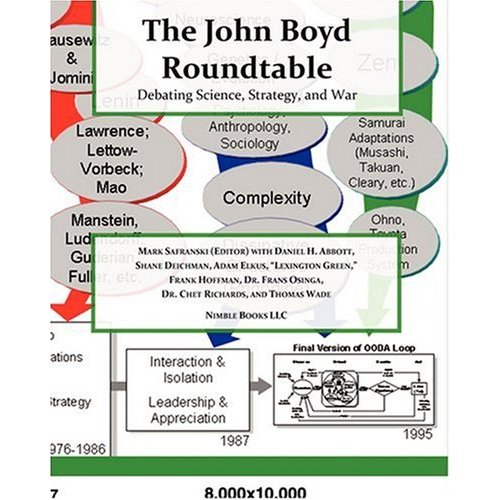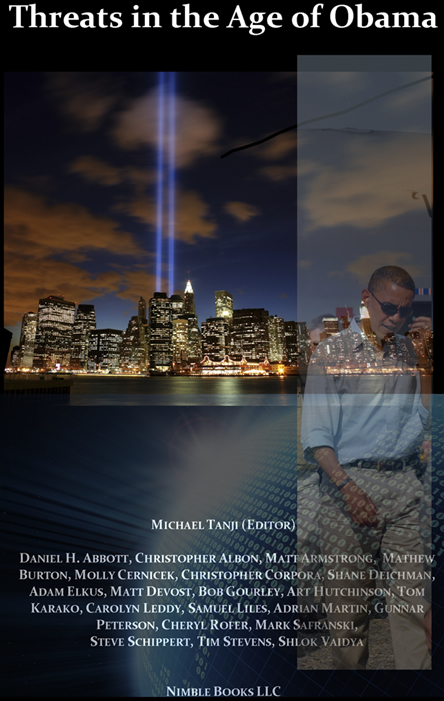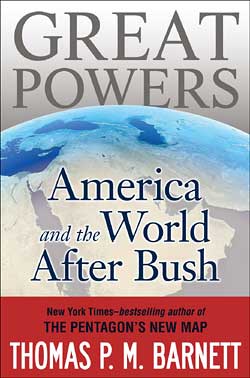Reflecting on Neo-COIN and the Global Insurgency, Part II.
Thursday, March 11th, 2010Previously, I took a look at an academic paper by David Martin Jones and M.L.R. Smith that engaged in a critical analysis of COIN theory and found fault with its underlying premises. Now, I would like to examine the rebuttal offered by John Nagl and Brian Burton of CNAS.
David Martin Jones* and M.L.R. Smith**. “Whose Hearts and Whose Minds? The Curious Case of Global Counter-Insurgency”. The Journal of Strategic Studies. Vol. 33, No. 1, 81-121, February 2010.
*University of Queensland, Australia. ** King’s College London, UK.
John A. Nagl and Brian M. Burton. “Thinking Globally and Acting Locally: Counterinsurgency Lessons from Modern Wars – A Reply to Jones and Smith. The Journal of Strategic Studies. Vol. 33, No. 1, 123-138, February 2010.
Center for New American Security (CNAS), Washington, DC, USA.
The rebuttal of Nagl and Burton, at a mere 15 pages including bibliography, was a more persuasive and focused argument than the COIN opus offered by Jones and Smith. Their tone was less academic and more practitioner-oriented, both in terms of policy shapers and soldiers in the field. Strategist Dr. Thomas P.M. Barnett, thought the entire debate was “too inside baseball” but nonetheless, that Nagl and Burton had the better of the exchange:
It is a sadly ghettoized argument–very inside baseball. And I am dismayed to see it happening in a sub-field that should be more inclusive than the usual war-discussed-within-the-context-of-war with the added dimension of the fight for political control in developing/failed economies (the whole national liberation bit, references to Maoism, etc.). So we’re still basically treated to two legs of the stool: security with the addition of politics/culture, but the economics remains a no-go-land that elicits the mention of jobs on occasion (the assumption usually being, public-sector financed with aid), but that’s it.
….I thought Nagl’s closing comment in response was fine: difference in degree but not kind. The first article reminded me of nuclear targeting theory, it was so esoterically wrapped around itself.
The intellectual insularity to which Tom complains arguably stems from COIN, an operational doctrine, being required to “pinch-hit” as a long-term strategy due to the abdication of responsibility by the civilian political elite to come to a strategic consensus among themselves on the war that would frame our global conflict with radicalized Islamist terror groups and insurgencies and enunciate the objectives we hope to achieve.
This unwillingness or inability of deeply divided USG civilian leaders to effectively, coherently and consistently articulate the nature of the war itself and our adversaries deprives our senior military leaders of appropriate policy guidance in designing campaigns and carrying out military operations. It is also a partial explanation for the determined resistance of COIN policy advocates like John Nagl and David Kilcullen to address the religious ideology dimension raised by Jones and Smith.
In “Thinking Globally and Acting Locally: Counterinsurgency Lessons from Modern Wars – A Reply to Jones and Smith”, Burton and Nagl firmly showcase “Neo-COIN’s” formidibile strengths as policy but cannot escape its’ enduring weakness. Here most concisely:
“Insurgencies, like other forms of armed conflict are better defined by methodologies than by ideologies. While causes change regularly, the fundamentals of insurgent strategy remain relatively constant”
A powerful throwing down of the theoretical gauntlet. It’s an appealing argument rooted in pragmatism, and to some degree, empiricism, becoming more true as one moves down to the level of small unit counterinsurgency and outward from jihadism’s core leadership toward insurgency’s marginal adherents of convenience, the “$10 a day Taliban” and Kilcullen’s “accidental guerrillas”. While it is the case that occasionally in COIN we have actions of “strategic corporals”, most of the warfighting concerns of NCO’s and junior officers will be tactical and eminently practical a majority of the time.
Earlier, Burton and Nagl expounded at greater length and specificity:
But this argument [by Jones and Smith] overemphasizes the superficial features of conflict. While specific characteristics of individual insurgencies have changed with local conditions and the technology of the day, the fundamental dynamics of insurgency remain largely the same. The essential competition remains between the existing power and the insurgents for influence and  ultimately control over populations. The insurgent ’cause’, of which extremist religion can be a component, is generalized and malleable in order to mobilize the broadest possible base of followers.
ultimately control over populations. The insurgent ’cause’, of which extremist religion can be a component, is generalized and malleable in order to mobilize the broadest possible base of followers.
….the fundamental dynamic of any insurgency is that, as David Kilcullen aptly describes, it needs the people to act in certain ways.[It] needs their sympathy, acquiescence and silence, or simply their reactions to provocation, in order to further [its] strategy
[Emphasis in original.]
There are pros and cons to this theoretical position. It is always a good idea to consider who an intended doctrine is written for; instrumentally, COIN doctrine is foremost for the soldiers who are expected to wage that kind of battle on the behalf of the rest of us. Only secondarily, is COIN doctrine intended as a kind of policy talisman for the government officials, politicians, journalists, academics and bloggers whom it has entranced or repelled. It is important to remember, it critiquing the evolving panoply that is USG COIN policy that the fundamental criterion of measurement is not theoretical niceties but real world results, which have been produced. Not perfection, not instantly, not everything we want plus a pony too, but progress in operational and tactical success. Even some strategic success if stabilization of an Iraqi government holds That weighs heavily on the pro side of the ledger.
The cons are of a different nature.
First, in terms of the Maoist paradigm, classical COIN theory is problematic because it extrapolates only from a very short period of Mao’s career as a guerrilla leader, mostly 1946 -1949 when the political dynamic in China’s civil war was a bilateral conflict between Chiang Kai-shek’s Nationalist government and Mao ZeDong Communist Party and Red Army. This was a period when Mao, courtesy of the Soviets, had suddenly inherited a great quantity of Japanese arms and could field divisions of semi-regulars to fight conventional battles in addition to insurgent units. Most of China’s long civil war was actually heterogeneously anarchic and Mao’s Communist armies were usually much inferior not only to those of the Kuomintang, but to those armies fielded by many provincial warlords and certainly inferior to the invading Imperial Japanese Army, which Mao strove to avoid fighting whenever possible. Much of Mao’s legend as a military genius is political myth constructed after the fact, and his ultimate success in China owed at least as much to Chiang, Hirohito, Stalin and Truman as it did to Mao’s real but frequently exaggerated political and military talent for insurgency.
Vietnam, another historical touchstone of COIN, acheived the bilateral conflict dynamic described in COIN theory only because initially the Vietcong, on the orders of Hanoi, tacitly supported Ngo Dinh Diem’s regime by eschewing military activities while Diem and Nhu systematically destroyed or weakened other potential military/political rivals to the Communists in South Vietnam. Namely, General Ba’s Hoa-Hao, the Binh Xuyen gangs and the Buddhist political clergy ( the Vietnamese Nationalist Party had previously been decimated by the French in 1930). Russia after WWI, Lebanon in the 1980’s, Somalia, Afghanistan and the Congo in the 1990’s are others examples of societies devolving into anarchic, social darwinian, violence before some became conflicts that are somewhat recognizable in COIN theory.
The heterodox Iraqi insurgency of the “surge”, where Neo-COIN found its proving ground, is really the recent historical rule and not the exception that classical Maoist COIN theory might lead you to believe. The theory in other words, is based upon flawed premises of a bilateral conflict. John Robb’s “open–source insurgency” concept gets closer to the probable reality of future COIN wars.
Secondly, the strong dismissal of religious drivers by Nagl under his “Kilcullen Doctrine” is tailor made for “disaggregating” the accidental guerrillas at the tactical level, but it seriously misleads us in understanding or effectively countering the “professional guerrillas” at the strategic or the moral levels of war. Instead, it blinds us by projecting our own elite culture’s secular assumption of religion as merely a cynical and antiquated facet of politics on to adversaries for whom such thought is both fundamentally alien and entirely blasphemous. Such a position is what ideologists of jihad argue that they are taking up arms against in the first place.
Erasing the religious or ideological motivation makes incisive analysis of the adversaries strategic decision-making impossible because it removes the driver for which he left home, comfort, family for the danger and privation of war. How can we walk in our enemies shoes, get inside his head, if we deny what is in his head has any relevance?
This position makes no sense on the strategic level. Ignoring the influence of Islamism is a prescription for errors and missed opportunities. It is a politically comfortable position for COIN theorists because our political elite are deeply enamored of a PC ideology that provides an excuse to punish and destroy the careers of officials who challenge the orthodoxy of multiculturalism with frank discussion of facts. Avoiding the question of Islamism in front of politicians greases the skids for COIN. Have you heard many members of Congress make a robust defense of liberal, democratic, capitalist, open societies as a morally superior alternative to autocratic Islamism lately? No? Well now you understand why the COIN gurus are not doing it either. Powerful people in Washington and the media do not want to hear thart message.
Yet without confronting Islamism and the attraction of its call to a dissatisfied “pious middle class” in the Islamic world, we can hardly hope to bring the war to a satisfactory close, much less victory.












